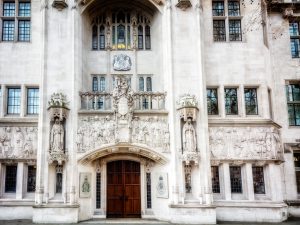
British Court to Rule on Death Sentences for Two Trinidad Murderers, The Guardian, 4th February 2015
- News
- 4 Feb 2015
Seven British judges will consider whether two convicted murderers from Trinidad should have their death penalty sentences lifted by the privy council.
The test case, starting on Wednesday, will raise the question of whether a court in London has legal authority to vary a hanging order imposed by judges in the Caribbean.
Shazad Khan and Timothy Hunte killed Ramkhelawan Charran at a fish farm in rural Trinidad in August 2003. Hunte, the gunman, shot Charran five times and later also admitted snatching a pile of cash.
Both Khan, the driver, and Hunte were sentenced to go to the gallows in 2008. Their convictions and sentence were upheld by the appeal court of Trinidad and Tobago two years later.
Because of the long period that has elapsed since the death penalty was imposed, however, neither men faces the hangman’s noose.
A 1993 landmark case, Pratt and Morgan, in the privy council established that it was inhumane treatment and illegal to keep a condemned prisoner on death row for more then five years after conviction.
The issue at stake this week relates to the continuing judicial dispute between the Caribbean and London over who should have power to commute a death sentence.
Fewer death penalty cases reach UK judges nowadays because most of the West Indian states that use the judicial committee of the privy council (JCPC) as a final court of appeal have scrapped mandatory execution for murder.
Additionally, Barbados and Belize, which previously referred appeals to the privy council, now direct them instead to the Caribbean court of justice (CCJ).
In Trinidad and Tobago, there is currently a energetic debate on the death penalty. As the murder rate rises (28 people have already been murdered in 2015) and the country approaches a general election, the sitting government is attempting to push through a so-called “hanging bill”, which attempts to circumvent the Pratt and Morgan decision by allowing the state to mete out the death sentence to convicted murderers, regardless of the time it takes for the appeal process to be exhausted.
Trinidad, where the CCJ is situated, is not a member. It remains within the privy council’s jurisdiction, a link that many West Indian politicians dismiss as an outdated relic of the British empire.
Khan and Hunte are represented by the Death Penalty Project based at the London law firm Simons Muirhead and Burton. Parvais Jabbar, co-executive director of DPP argues, that if the conviction appeals fail, following previous precedents, the privy council should commute the men’s sentences to terms of imprisonment.
Lawyers for the state of Trinidad and Tobago will argue that the privy council does not have the legal authority to dismiss the death penalties. Instead, the men should petition the state president or apply to the high court in the capital, Port of Spain, for the sentences to be commuted.
“The real question is who can commute the death sentence,” Jabbar said. “The JCPC has been asked by lawyers for the state to consider overturning a recent decision which allowed a domestic court in Trinidad to commute a sentence of death if the five-year period has expired – a sensible and practical step.
“There is no justifiable reason to reconsider the recent ruling. However, if the [privy council] does rule against us, it may open the door for a reconsideration by us as to whether we should seek to reopen previous important decisions on the mandatory death penalty decided by a narrow majority where lives were at stake.”
Because the case is considered to be of such importance, seven justices who also sit on the supreme court will hear the case. They are Lord Neuberger, president of the supreme court, Lady Hale, deputy president, and Lords Mance, Clarke, Sumption, Reed and Toulson.
Photo credit: Garry Knight (Flickr, Creative Commons), https://creativecommons.org/licenses/by/2.0/




















